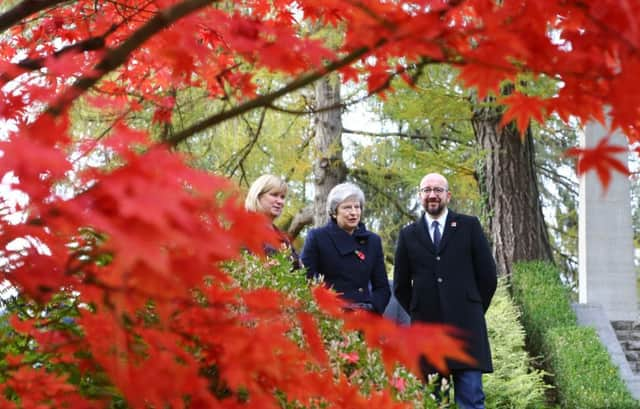'˜Staunch to the end'... PM's poetic tribute to fallen at Mons


They were, said Thersea May, quoting Laurence Binyon, “staunch to the end against odds uncounted”.
The next stanza of Binyon’s poem, For The Fallen, written when the First World War was not yet a year old, will be read a thousand times up and down the land tomorrow, as the centenary of the armistice is observed.
“They shall grow not old, as we that are left grow old:
Age shall not weary them, nor the years condemn.
At the going down of the sun and in the morning,
We will remember them.”
Advertisement
Hide AdAdvertisement
Hide AdYesterday, it was Binyon’s words that Mrs May carried with her, written in blue pen on a Downing Street headed card and attached to a garland of poppies.
Alongside the French President, Emmanuel Macron, and the Belgian Prime Minister, Charles Michel, she set the tone for the weekend as she arrived first at the St Symphorien Military Cemetery in Belgium.
It had been established by the German army as a final resting place for British and German soldiers killed at the Battle of Mons, the first major action of the British Expeditionary Force, in the summer of 1914 and one of the last towns to be liberated.
She and Mr Michel were greeted by a guard of honour from the Royal Regiment of Fusiliers and stood for the sound of The Last Post before a minute’s silence.
Advertisement
Hide AdAdvertisement
Hide AdMrs May laid wreaths at the facing graves of the first and last British soldiers to die in the conflict.
Private John Parr of the Middlesex Regiment, who died on August 21, 1914, was just 17 years and one month old.
Private George Ellison of the Royal Irish Lancers, was 40 when he met his end as he patrolled the outskirts of Mons, an hour and a half before the armistice took effect. Back home in Leeds, his wife, Hannah, and their son, James, five days short of his fifth birthday, did not learn what had happened until just before Christmas, more than a month later.
At his grave, she placed the handwritten card and the garland of poppies.
Advertisement
Hide AdAdvertisement
Hide AdShe quoted another line of wartime poetry, The Soldier by Rupert Brooke, at Private Parr’s grave. “There is in that rich earth a richer dust concealed,” he had written, while on leave at Christmas. It formed part of a collection of work called 1914, published the following January.
Some 80 miles from St Symphorien, Mrs May and M Macron toured the site of the Thiepval Memorial, east of Amiens, which bears the names of more than 72,000 servicemen who died in battle.
The two leaders placed a garland combining poppies and cornflower le bleuet, the national emblems of remembrance for Britain and France.
On it Mrs May left a card with an extract from A Soldier’s Cemetery by another war poet, Sgt John William Streets, who had gone out with the Sheffield City “Pals” Battalion.
Advertisement
Hide AdAdvertisement
Hide AdIt read: “There lie the flower of youth, the men who scorn’d to live (so died) when languished liberty.”
Sgt Streets, known among his 11 siblings as Will, was missing in action for 10 months before his body was recovered from no-man’s land. His poetry was published posthumously.